|
Super Bowl XXIII - San Francisco 49ers vs Cincinnati Bengals: Pregame
San Francisco coach Bill Walsh had been privately contemplating retirement since the offseason before the 1987 season.
- The 49ers had not made it past the first round of the playoffs for two years after winning Super Bowl XIX over the Miami Dolphins. And they were ousted in the first round in 1987 as well.
- Bill's wife Kristine recalled: "The losses were already becoming major depressions. Often for days afterward, he wouldn't talk and couldn't eat. And it would eventually get a lot worse. Mostly he was disappointed in himself. He blamed himself for every time his team fell short. And when he kept falling short, it shook his confidence. He started saying, 'I know how to build a team, but I can't sustain it,' and talking about wanting to take an expansion job where he could start a new team."
- Bill raised none of these issues with 49ers owner Eddie DeBartolo when they had their annual off-season meeting in January 1988.
- Walsh told DeBartolo that 1988 would be a transition season as well but, with solid young players from the 1985 and '86 drafts forming a solid backbone, he expected to return to the Super Bowl in 1989.
Walsh's anxiety deepened when his tenth Niners team started the 1988 season
6-5. Part of the reason for the mediocre start was the ongoing quarterback controversy.
- Walsh had been worried about QB Joe Montana's health, especially after Joe underwent back surgery in 1986. So San Francisco sent two draft choices to Tampa Bay in 1987 to obtain QB Steve Young.
- Young started three games during the '88 season and relieved Joe in several others.
- Walsh wrote in his 1990 book Building a Champion: "Steve Young was a talent ... comparable to Montana. As good a runner as Joe has been and as spontaneous and instinctive as he has been, Steve is even better. Steve's speed is around 4.5 for 40 yards and he is considered to be possibly the best running quarterback ever." He added, "We were pleased and gratified with Steve Young's progress, but Joe Montana was our quarterback."
DB Ronnie Lott organized a players-only meeting that turned the season around. RB Roger Craig recalled: "People were saying there was no way we were going to make the playoffs. We called a team meeting, and we kicked the coaches out of the room. We took ownership of our team."
- The rejuvenated 49ers ripped off four wins in a row to clinch a playoff spot. A loss to the Los Angeles Rams in the final game of the regular season created a three-way tie for first in the division with the New Orleans Saints being the third 10-6 team. NFL tie-breaking rules eliminated the Saints from the playoffs and gave the division title, and the first round bye that went with it, to the 49ers.
- The Niners thumped Minnesota 34-9 at home in the second round of the playoffs for their first postseason victory since Super Bowl XIX. Then they went to Chicago and upended the Bears 28-3 in frigid January weather: -26° wind chill with 29 mph wind.
In contrast with the 49ers so-so start, the Cincinnati Bengals began the 1988 season with six straight wins.
- Using a no-huddle offense, they never lost two games in a row on their way to a 12-4 record
and a two-game edge in the AFC Central.
- Fifth-year QB Boomer Esiason led the league in yards per pass attempt (9.2) and quarterback rating (97.4). Those statistics earned him the NFL Most Valuable Player award.
After the dreadful 1987 season, Esiason took a four-month break from football during which he decided to concentrate on playing football. "I made up my mind I wasn't going to let anything get in the way of playing football this year. I turned down endorsements. I turned down requests for interviews. I turned down being the player rep."
- Running behind an offensive line that boasted three Pro Bowlers, Max Montoya, Anthony Munoz, and TE Rodney Holman, rookie FB Ickey Woods gained 1,066y while eight-year veteran James Brooks added 931.
The signature move of the Bengals' season was the "Ickey Shuffle," a dance that Woods performed after each of his 15 touchdowns. The staid NFL reacted to the dance by making a rule designating it (and similar antics by other players) as "Excessive Celebration" subject to a penalty.
- The result was an offense that led the NFL in points (448), yards per game (393), and rushing yards per game (170). They score 30 or more points six times, with three games over 40.
- However, they proved in the playoffs they could win when their offense was held below its averages. Both victories were hard fought, 21-13 over the Seahawks and 21-10 over the Bills.
The Bengals were the last AFC team the 49ers wanted to face in the Super Bowl.
- Cincinnati coach Sam Wyche was a backup quarterback for the Bengals from 1968 to 1970 when Bill Walsh was wide receivers coach and de facto offensive coordinator for Paul Brown.
- Even then, Walsh targeted Wyche as a potential coach. "He was bright ... and had a real organizational command, everything you'd want in a coach," said Walsh.
- No wonder Walsh hired Wyche as quarterbacks coach for his first 49ers staff in 1979. Sam was instrumental in convincing Walsh to draft Joe Montana. Then Wyche's coaching helped Joe move from backup quarterback his first two seasons to starter in the third.
- When Wyche became the Bengals head coach in 1984, he implemented Walsh's "West Coast offense," which utilized short, horizontal passing routes to stretch out defenses and increase the potential for long runs or long passes.
- Wyche had barely avoided being fired after the 1987 season when the Bengals finished 4-11 amid clashes with Esiason. The press and the fans wanted him gone. "They were saying, 'Get rid of the bum,'" Wyche recalled. "If I'd been the owner, I'd have been questioning myself." He expected the inevitable when General Manager Paul Brown met with him at Christmas time. Instead, Brown lectured Wyche for two hours and then gave him a reprieve.
- If anyone knew Walsh's mind and tendencies, it was Wyche. 49ers WR Jerry Rice recalled, "He knew how Coach Walsh drew up a game plan, and he probably had as good an awareness of any coach regarding Joe's tendencies." Montana added, "That was the biggest concern for us; changing plays was made more difficult."
Two announcements on the Monday of Super Bowl rattled the 49er community.
- Eddie DeBartolo told the press that he believed Walsh had decided to retire and expected him to make the announcement within 48 hours after the Super Bowl.
Walsh wrote in his autobiography: "By Super Bowl week, I had privately decided to retire, but I didn't announce my decision because I was concerned about the team and the future of the organization. I did not want my decision to become a public spectacle, setting up a 'win-one-for-the-Gipper' type of scenario. ... I didn't want to go public because it would be a distraction to everybody. I was determined not to let this become a sideshow. It was the team's game to win or lose. I didn't want my situation to be a factor in how we played, and I didn't want to divert any attention from the players."
- The 49ers said that Jerry Rice, who had been hobbled by an injured right ankle since October 16, reinjured the ankle in the team's first Florida practice. Walsh said he would hold Rice out of practice for several days but expected that he would play on Sunday.
Rice recalled: "My preparation became more difficult when I reaggravated an ankle injury on a Monday workout. I had a sprained ankle all season long. It was like the worst injury because it gets fatigued. Then swells. That was something I was fighting all season. After limping around for a few days, I was finally able to work out on it, but I was still not able to make the cuts as well as I like. It required a lot of treatment all week, and I really was not sure what level I could play at come Sunday."
- Sam Wyche gave this reaction to the news about Rice. "I hope he can play. The two teams should be at full strength to decide who's the best team of the 1988 season."
Wyche admitted that his past history with Walsh gave him some advantage.
- "You can have a generic playbook and adjust as you go along. Or you can attack a weakness in the defense. That is Bill's way, and I learned it from him."
- The Bengals hoped to confuse the 49ers with their no-huddle, racehorse offense. They wanted to run inside, control the ball, and keep Montana & Company off the field.
- The quarterback who would implement the Bengals' offensive game plan, Boomer Esiason, admitted that he and Wyche had "two run-ins" during the 1986 and '87 seasons.
- But they were united now. "I realize he (Sam) knows the quarterback position better than any coach in the league. He's an offensive genius. I'm not afraid to throw that word around because he's not afraid to try things. ... He's an innovator. ... I owe an awful lot of credit to him for my success, and I'm not afraid to admit that."
- Esiason would play with a sore left shoulder that had plagued him throughout the playoffs.
Super Bowl week in Miami was marred by three days of riots in the Overtown section of the city.
- The turmoil was sparked on Monday by a Hispanic police officer shooting a black motorcyclist. What amounted to a minor traffic violation escalated into violence with rock and bottle throwing, looting, and cars being torched.
- The Bengals were in the Omni Hotel six blocks from the flames. They could see the fires from their hotel room windows. The 49ers were eight miles away at the Miami Hilton.
- Players on both teams had to be careful about where they went.
The 49ers were favored by seven points to become the seventh NFC champion to win in the last eight Super Bowls. However, the Bengals appeared to be the AFC's strongest Super Bowl representative since the 1983 Raiders.
The Bengals' chances took a hit when backup fullback and short-yardage specialist Stanley Wilson, who had already been suspeded three times by the NFL for drug abuse, was caught using cocaine in his hotel room the night before.
Wyche on Wilson: "I think he would have made people miss and would not have been affected by the turf. I remember when I broke the news, several players slammed their playbooks on the floor, and others put their heads in their hands. Everybody was upset, but for different reasons. Some were upset because Stanley was a good guy and had lost to drugs. Some were made because he'd just hurt their chances to win the Super Bowl."
49ers S Eric Wright recalled: "We had a lot of players who hadn't been on the 49ers when we'd last won a Super Bowl. But in the locker room before the game, I did't detect any of those guys being any more nervous than the rest of us. ... We weren't a team that needed pregame pep talks. In fact, the only pep talk I remember before the game was by Ronnie (Lott), I think, or someone else who said we should put everything into Super XXIII because it could be some of the guys' last game, and we had to make sure they went out the right way. But I don't think that Ronnie or anyone else knew that both Bill Walsh and our veteran C Randy Cross would retire after the game."
It was NBC's turn to televise the Super Bowl.
- Dick Enberg did the play by play for his fourth Super Bowl telecast while analyst Merlin Olsen did his fifth.
- As had become customary, Jack Buck and Hank Stram handled the CBS radio broadcast.
- Billy Joel lip-synced the National Anthem.
- Three members of the Dolphins' undefeated 1972 team were present for the coin toss: Nick Buoniconti, Bob Griese, and Larry Little.
|
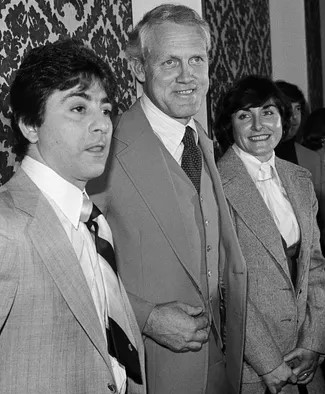
Eddie DeBartolo with Bill and
Kristine Walsh
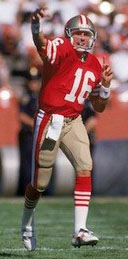
Joe Montana
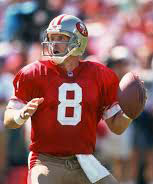
Steve Young
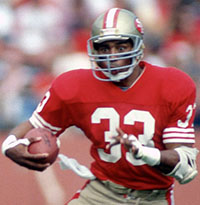
Roger Craig
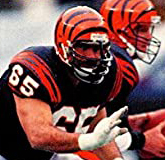
Max Montoya
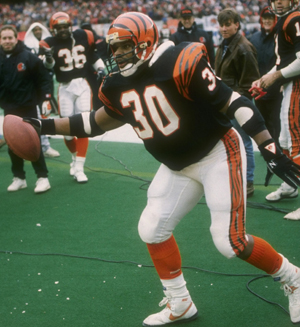
Ickey Woods does his Shuffle
after scoring a touchdown.
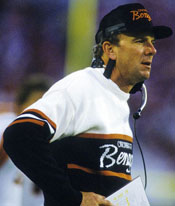
Sam Wyche
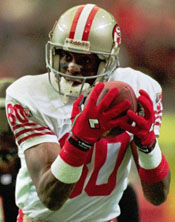
Jerry Rice
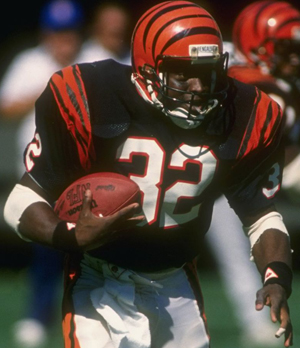
Stanley Wilson
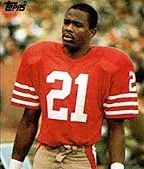
Eric Wright
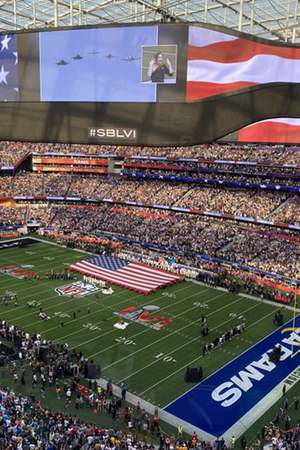
Pregame ceremony
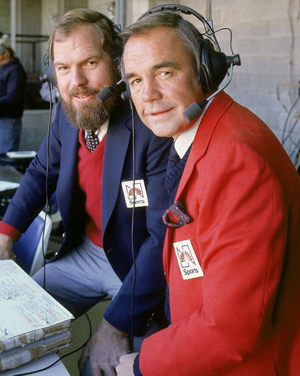
Merlin Olsen and Dick Enberg
|
1988 San Francisco 49ers
| # |
Player |
Pos. |
Hgt. |
Wgt. |
College |
Exp. |
| 4 |
Max Runager |
P |
6-1 |
190 |
South Carolina |
10 |
| 6 |
Mike Cofer |
K |
6-1 |
195 |
North Carolina State |
2 |
| 8 |
Steve Young |
QB |
6-2 |
215 |
Brigham Young |
4 |
| 9 |
Barry Helton |
P |
6-3 |
205 |
Colorado |
1 |
| 16 |
Joe Montana |
QB |
6-2 |
200 |
Notre Dame |
10 |
| 21 |
Eric Wright |
CB |
6-1 |
185 |
Missouri |
8 |
| 22 |
Tim McKyer |
CB |
6-0 |
175 |
Texas-Arlington |
3 |
| 24 |
Harry Sydney |
RB |
6-0 |
215 |
Kansas |
2 |
| 26 |
Darryl Pollard |
CB |
5-11 |
185 |
Weber State |
2 |
| 29 |
Don Griffin |
CB |
6-0 |
175 |
Middle Tennessee St |
3 |
| 32 |
Terrence Flagler |
RB |
6-0 |
200 |
Clemson |
2 |
| 33 |
Roger Craig |
RB |
6-0 |
220 |
Nebraska |
6 |
| 35 |
Del Rodgers |
RB |
5-10 |
210 |
Utah |
7 |
| 38 |
Greg Cox |
DB |
6-0 |
225 |
San Jose State |
1 |
| 42 |
Ronnie Lott |
CB |
6-0 |
205 |
USC |
8 |
| 44 |
Tom Rathman |
RB |
6-1 |
230 |
Nebraska |
3 |
| 46 |
Tom Holmoe |
DB |
6-2 |
190 |
Brigham Young |
6 |
| 49 |
Jeff Fuller |
S |
6-2 |
215 |
Texas A&M |
5 |
| 50 |
Riki Ellison |
LB |
6-2 |
225 |
USC |
6 |
| 51 |
Randy Cross |
C |
6-3 |
260 |
UCLA |
13 |
| 53 |
Bill Romanowski |
LB |
6-4 |
245 |
Boston College |
1 |
| 54 |
Ron Hadley |
LB |
6-2 |
240 |
Washington |
2 |
| 55 |
Jim Fahnhorst |
LB |
6-4 |
230 |
Minnesota |
5 |
| 57 |
Sam Kennedy |
LB |
6-3 |
235 |
San Jose State |
1 |
| 58 |
Keena Turner |
LB |
6-2 |
220 |
Purdue |
9 |
| 60 |
Chuck Thomas |
C |
6-3 |
275 |
Oklahoma |
4 |
| 61 |
Jesse Sapolu |
G |
6-4 |
270 |
Hawaii |
6 |
| 62 |
Guy McIntyre |
G |
6-3 |
275 |
Georgia |
5 |
| 67 |
Pete Kugler |
NT |
6-4 |
255 |
Penn State |
8 |
| 69 |
Bruce Collie |
G |
6-6 |
275 |
Texas-Arlington |
4 |
| 72 |
Jeff Stover |
DE |
6-5 |
275 |
Oregon |
7 |
| 74 |
Steve Wallace |
T |
6-4 |
285 |
Auburn |
3 |
| 75 |
Kevin Fagan |
DE |
6-3 |
260 |
Miami (FL) |
2 |
| 77 |
Bubba Paris |
T |
6-6 |
300 |
Michigan |
6 |
| 78 |
Pierce Holt |
DE |
a6-4 |
275 |
Angelo State (TX) |
1 |
| 79 |
Harris Barton |
T |
6-4 |
285 |
North Carolina |
2 |
| 80 |
Jerry Rice |
WR |
6-2 |
200 |
Mississippi Valley State |
4 |
| 82 |
John Taylor |
WR |
6-1 |
185 |
Delaware State |
2 |
| 83 |
Terry Greer |
WR |
6-1 |
190 |
Alabama State |
3 |
| 84 |
Brent Jones |
TE |
6-4 |
230 |
Santa Clara |
2 |
| 85 |
Mike Wilson |
WR |
6-3 |
215 |
Washington State |
8 |
| 86 |
John Frank |
TE |
6-3 |
225 |
Ohio State |
5 |
| 89 |
Ron Heller |
TE |
6-3 |
235 |
Oregon State |
2 |
| 91 |
Larry Roberts |
DE |
6-3 |
270 |
Alabama |
3 |
| 94 |
Charles Haley |
DE |
6-5 |
252 |
James Madison |
3 |
| 95 |
Michael Carter |
NT |
6-2 |
285 |
SMU |
5 |
| 96 |
Daniel Stubbs |
DE |
6-4 |
260 |
Miami (FL) |
1 |
|
1988 Cincinnati Bengals
| # |
Player |
Pos. |
Hgt. |
Wgt. |
College |
Exp. |
| 3 |
Jim Breech |
K |
5-6 |
160 |
California |
10 |
| 7 |
Boomer Esiason |
QB |
6-5 |
225 |
Maryland |
5 |
| 11 |
Lee Johnson |
P |
6-2 |
200 |
Brigham Young |
4 |
| 12 |
Mike Norseth |
QB |
6-2 |
200 |
Kansas |
1 |
| 15 |
Turk Schonert |
QB |
6-1 |
190 |
Stanford |
8 |
| 20 |
Ray Horton |
DB |
5-10 |
190 |
Washington |
6 |
| 21 |
James Brooks |
RB |
5-10 |
180 |
Auburn |
8 |
| 22 |
Eric Thomas |
DB |
5-11 |
185 |
Tulan |
2 |
| 23 |
Marc Logan |
RB |
6-0 |
215 |
Kentucky |
2 |
| 24 |
Lewis Billups |
DB |
5-11 |
190 |
North Alabama |
3 |
| 25 |
Daryl Smith |
DB |
5-9 |
185 |
North Alabama |
2 |
| 27 |
Barney Bussey |
DB |
6-0 |
215 |
South Carolina State |
3 |
| 29 |
Rickey Dixon |
DB |
5-11 |
185 |
Oklahoma |
1 |
| 30 |
Ickey Woods |
RB |
6-2 |
230 |
UNLV |
1 |
| 32 |
Stanley Wilson |
RB |
5-10 |
210 |
Oklahoma |
6 |
| 33 |
David Fulcher |
DB |
6- |
235 |
Arizona State |
3 |
| 36 |
Stanford Jennings |
RB |
6-1 |
205 |
Furman |
5 |
| 41 |
Solomon Wilcots |
DB |
5-11 |
190 |
Colorado |
2 |
| 51 |
Leon White |
LB |
6-3 |
240 |
Brigham Youg |
3 |
| 53 |
Leo Barker |
LB |
6-2 |
225 |
New Mexico State |
5 |
| 55 |
Ed Brady |
LB |
6-2 |
240 |
Illinois |
5 |
| 57 |
Reggie Williams |
LB |
6-1 |
230 |
Dartmouth |
13 |
| 58 |
Joe Kelly |
LB |
6-2 |
225 |
Washington |
3 |
| 60 |
Dave Smith |
T |
6-6 |
290 |
Southern Illinois |
1 |
| 64 |
Bruce Kozerski |
C |
6-4 |
285 |
Holy Cross |
5 |
| 65 |
Max Montoya |
G |
6-5 |
280 |
UCLA |
10 |
| 67 |
David Douglas |
C |
6-4 |
280 |
Tennessee |
3 |
| 69 |
Tim Krumrie |
NT |
6-2 |
270 |
Wisconsin |
6 |
| 70 |
Jim Skow |
DE |
6-3 |
255 |
Nebraska |
3 |
| 72 |
Skip McClendon |
DE |
6-6 |
280 |
Northwestern/Ariz. St. |
2 |
| 73 |
Eddie Edwards |
DE |
6-5 |
255 |
Miami (FL) |
12 |
| 74 |
Brian Blados |
T |
6-5 |
300 |
North Carolina |
5 |
| 75 |
Bruce Reimders |
G |
6-7 |
285 |
Iowa State |
5 |
| 78 |
Anthony Munoz |
T |
6-6 |
280 |
USC |
9 |
| 80 |
Cris Collinsworth |
WR |
6-5 |
190 |
Florida |
8 |
| 81 |
Eddie Brown |
WR |
6-0 |
185 |
Miami (FL) |
4 |
| 82 |
Rodney Holman |
TE |
6-3 |
240 |
Tulane |
7 |
| 85 |
Tim McGee |
WR |
5-10 |
185 |
Tennessee |
3 |
| 86 |
Carl Parker |
WR |
6-2 |
200 |
Vanderbilt |
1 |
| 87 |
Jim Riggs |
TE |
6-5 |
245 |
Clemson |
2 |
| 89 |
Ira Hillary |
WR |
5-10 |
190 |
South Carolina |
2 |
| 90 |
Emanuel King |
LB |
6-4 |
250 |
Alabama |
4 |
| 91 |
Carl Zander |
LB |
6-2 |
235 |
Tennessee |
4 |
| 96 |
Curtis Maxey |
DE |
6-3 |
300 |
Grambling State |
1 |
| 98 |
David Grant |
DT |
6-4 |
275 |
West Virginia |
1 |
| 99 |
Jason Buck |
DE |
6-5 |
270 |
Brigham Young |
2 |
|
References: The Super Bowl: Celebrating a Quarter-Century of America's Greatest Game (1990)
Building a Champion: On Football and the Making of the 49ers, Bill Walsh with Glenn Dickey (1990)
Super Bowl Chronicles: A Sportswriter Reflects on the First 30 Years of America's Game, Jerry Green (1995)
Super Bowl: The Game of Their Lives, Danny Peary (ed.) (1997)
The Genius: How Bill Walsh Reinvented Football and Created an NFL Dynasty, David Harris (2008)
The Ultimate Super Bowl Book, Bob McGinn (2009)
Best of Rivals: Joe Montana, Steve Young, and the INSIDE STORY behind the NFL's Greatest Quarterback Controversy,
Adam Lazarus (2012)
50 Years, 50 Moments: The Most Unforgettable Plays in Super Bowl History, Jerry Rice and Randy O. Williams (2015)
Super Bowl Gold: 50 Years of the Big Game, Sports Illustrated (2015)
The Super Bowl: The First Fifty Years of America's Greatest Game, David Fischer (2015)
Montana: The Biography of Football's Joe Cool, Keith Dunnavant (2015)
The First 50 Super Bowls: How Football's Championships Were Won, Ed Benkin (2018)
Classic Bengals: The 50 Greatest Games in Cincinnati Bengals History, Steve Watkins and Dick Maloney (2018)
|
|